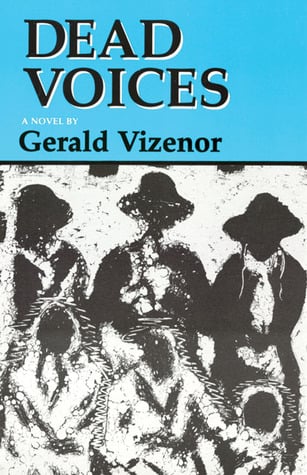Gerald Vizenor intends in his fictions to pay due homage to Coyote, the American Indian trickster figure, through twist-and-turn narrative high jinks. He has often been successful, notably in the rollicking novel Griever: An American Monkey King in China, a comic masterwork in which a visiting Native American scholar sets a nation of a billion citizens on its ear, while Mao spins in his grave and Coyote howls. Dead Voices is more academic and nowhere as successful. Its form is taken from wanaki, an Indian card game that resembles tarot, except that its players are transformed into the characters they turn up: bears, owls, lice, and so on. The conceit is familiar enough: Italo Calvino and Umberto Eco played with novel-as-cardgame structures for years, and they barely missed the preciousness that overly intellectualized plots often degenerate into.
In Dead Voices, a professor at the University of California (like Vizenor himself) meets an urban shaman named Bagese Bear, who wanders the streets of Oakland dispensing advice and consulting with passing birds. Fascinated, the narrator asks Bagese to teach him the art of communicating with animals. Bagese takes him to her apartment, turns up the first card, and off they go down a tortuous trail that involves transparent symbolism, awful punning, literary allusion (our shaman quotes the work of Elias Canetti, the Bulgarian writer-philosopher), parodies of American Indian oral narratives, and more than one instance of downright dull lecturing. Vizenor wants us to understand that American Indians inhabited an idyllic universe until the arrival of the Europeans, who ruined the continent with “loans, sewing machines, metal bundles, engines, and steering wheels.” It’s a fair enough charge, I suppose, but after the Columbian quincentenary and its accompanying rantings, it’s hardly unfamiliar.
All Europeans and their descendants (whom Vizenor calls “wordies”) are, in his view, corrupt. And all Native Americans are intrinsically good, if now dislocated and powerless in the new world of reservations and rat-infested urban ghettoes: “The land was discovered by those who were dead in the heart and unforgiven. The tribes were scarred with inventions, and our stories were removed with the animals. Our voices ended on a schedule of civilization, and the war ended in translation.” Regrettably, Vizenor too often sinks to the sort of ad hominem and ad captandum argumentation that George Orwell so devastatingly parodied in Animal Farm (“four legs good, two legs bad”); the idea, I suppose, is to make all Anglos feel personally responsible for the crimes of their fathers.
Vizenor is capable of great subtlety and humor—as I said, Griever is a howlingly funny book and a real pleasure to read—but the heavy-handedness of his approach often makes Dead Voices a chore. Because his characters are symbols in a morality play, figures who never come alive, the title of his novel is entirely apt. In fact, considered alongside Leslie Silko’s remarkable Almanac of the Dead, in which the narrator prophesies a continent-wide Indian uprising and the forced removal of whites from the Americas, Vizenor’s criticism seems flat.
The book has its moments, however. The second chapter, “Bears,” nicely depicts the shamanic metamorphosis of man into grizzly and imagines an America of picket-fence suburbs inhabited by marauding ursines who keep the locals honest. (Vizenor’s call for a salmon stream behind every well-groomed cul-de-sac has a certain appeal, too.) And Vizenor, finally slipping into Coyote’s skin, pulls off a good joke when his characters transform themselves into fleas and bring down an exterminator or two, transferring a touch of the Little Big Horn to the Bay Area.
But the good points don’t quite add up to a good novel. In preaching to the choir while the rest of the congregation slumbers, Gerald Vizenor has turned a potentially fine novel into an exclusionary sermon. Reliant on formula and innuendo, Dead Voices fails to live up to his great promise.
[Dead Voices: Natural Agonies in the New World, by Gerald Vizenor (Norman, Oklahoma: University of Oklahoma Press) 144 pp., $17.95]



Leave a Reply